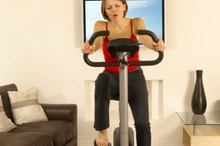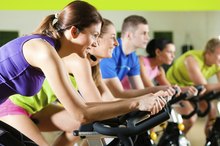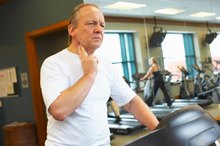More Articles
Is Exercise the Cause of Hyperventilation?
Hyperventilation is a state of uncontrolled, rapid breathing. The fast-paced breathing expels more carbon dioxide from your body than usual, causing your blood's carbon dioxide level to drop and its pH to rise. As a result, the arteries constrict, causing feelings of dizziness or light-headiness. Other symptoms of hyperventilation include chest pain, numbness or tingling in the arms, weakness and confusion. Hyperventilation can be brought on as a result of the changes that occur in your body during exercise.
Exercise
A certain workload -- intensity along with duration of exercise -- induces hyperventilation, according to findings by "The British Journal of Sports Medicine." This onset during exercise is caused by changes that your body undergoes to prepare for the increase in activity 2. In anticipation of exercise, your brain sends signals to the respiratory center to increase breathing to meet oxygen demands. In certain situations, such as panic or accumulation of lactic acid from intense exercise, breathing may become abnormally rapid and hyperventilation occurs.
- A certain workload -- intensity along with duration of exercise -- induces hyperventilation, according to findings by "The British Journal of Sports Medicine."
- In certain situations, such as panic or accumulation of lactic acid from intense exercise, breathing may become abnormally rapid and hyperventilation occurs.
Pain Perception
How Do Vital Signs Change During Anaerobic Exercise?
Learn More
Panic is a common cause of hyperventilation, according to the National Library of Medicine 2. During intense exercise, you might experience feelings of panic if the effort becomes too hard. Discomfort felt in overly working muscles and labored breathing may also produce panic. The University of Iowa found that during overexertion, if people think they are having trouble breathing, they will breathe faster to compensate. The perception of pain from intense exercise can cause panic and may result in rapid breathing and hyperventilation.
- Panic is a common cause of hyperventilation, according to the National Library of Medicine 2.
- The perception of pain from intense exercise can cause panic and may result in rapid breathing and hyperventilation.
Lactic Acidosis
A study by the University of Iowa found that the accumulation of lactic acid in fatiguing muscles during exercise causes blood pH -- concentration of hydrogen ions -- to drop below normal.The mechanisms in the blood that normally buffer -- prevent changes in pH -- are overridden by the rate of lactate production during intense exercise, and pH continues to drop. Breathing rate is increased and hyperventilation occurs to rid the body of excess hydrogen along with carbon dioxide, and to compensate for the drop in pH.
Stopping Hyperventilation
What Happens to the Intercostal Muscles in Exercise?
Learn More
Carbon dioxide levels in the blood must be restored to correct hyperventilation, according to Kenneth Saladin, author of "Anatomy and Physiology: The Unity of Form and Function." Breathing in and out of a paper bag -- the expelled air contains carbon dioxide -- is one recommended method 1. Covering your mouth and breathing through one nostril is another method. Hyperventilation onset by panic should be corrected by attempting to remain calm and inhaling deeply.
- Carbon dioxide levels in the blood must be restored to correct hyperventilation, according to Kenneth Saladin, author of "Anatomy and Physiology: The Unity of Form and Function."
- Breathing in and out of a paper bag -- the expelled air contains carbon dioxide -- is one recommended method 1.
Related Articles
References
- "Anatomy and Physiology: The Unity of Form and Function"; Kenneth Saladin; 2010
- "British Journal of Sports Medicine"; Is Lactic Acidosis a Cause of Exercise Induced Hyperventilation at the Respiratory Compensation Point?; T. Meyer, et al.; 2004
- MedlinePlus; Hyperventilation; July 2010
- Schwartzstein RM, Richards J, Edlow JA, Roy-Byrne PP. Hyperventilation syndrome. UpToDate. Updated December 10, 2019.
- Schwartzstein RM, Richards J, Edlow JA, Roy-Byrne PP. Hyperventilation syndrome. Updated December 10, 2019.
- Gerez M, Sada A. Tello A. Amygdalar hyperactivity, a fear-related link between panic disorder and mesiotemporal epilepsy. Clin EEG Neurosci. 2011;42(1):29-39. doi:10.1177/155005941104200108
- Lechtzin N. Hyperventilation syndrome. Merck Manual Professional Version. Updated April 2018.
- American Heart Association. About heart attacks. Updated July 31, 2016.
- Whited L, Graham DD. Abnormal respirations. StatPearls. Updated July 30, 2019.
- MedlinePlus. Hyperventilation. Updated June 28, 2018.
- West JB. High-altitude medicine. Am J Respir Crit Care Med. 2012;186(12):1229-1237. doi:10.1164/rccm.201207-1323CI:1229-37
- Jones M, Harvey A, Marston L, O'connell NE. Breathing exercises for dysfunctional breathing/hyperventilation syndrome in adults. Cochrane Database Syst Rev. 2013;(5):CD009041. doi:10.1002/14651858.CD009041.pub2
Writer Bio
Based in Perry, Ohio, Marissa Baranauskas is a Division I and cross-country athlete specializing in articles covering distance running and general fitness. Baranauskas is a certified personal trainer and is pursuing her bachelor's degree in exercise physiology at the University of Akron.









